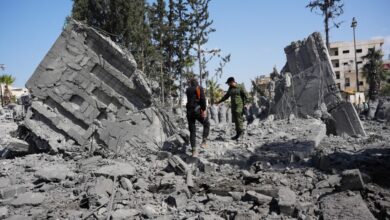Joint US-Turkey ground patrols begin in Syria border zone
U.S. and Turkish troops began joint ground patrols in northeast Syria near the Turkish border on Sunday, September 8, the U.S.-led Coalition said.
The patrols came as the first phase of an agreement reached in August between the U.S. and Turkey to manage tensions between Turkey and elements of the Syrian Democratic Forces, an alliance of militias backed by the Global Coalition Against ISIS.
“Today, U.S. and Turkish military forces conducted a joint ground patrol inside the security mechanism area in northeast Syria,” Coalition spokesperson Colonel Myles B. Caggins III said in a statement.
“Today’s patrol maintained security within the area and demonstrates our continued commitment to address Turkey’s legitimate security concerns, while also allowing the Coalition and our SDF partners to remain focused on achieving the enduring defeat of Daesh,” the statement read.

“The security mechanism is in the best interest of all involved,” said Major General Hill, commander of Special Operations Joint Task Force, Operation Inherent Resolve.
The first ground patrol included both Turkish and U.S. soldiers, vehicles, helicopters and unmanned aerial vehicles and began at 9:17 a.m. near the Syrian town of Tal Abyad (Gire Spi) and ended at 12:51 as planned, Turkey’s Ministry of National Defense said in a statement.
The SDF in a statement confirmed the joint patrols began east of Tal Abyad, between the villages of Noss Tal and Hashisha.
“Our allies observed first-hand progress on destroyed YPG fortifications and areas where YPG elements voluntarily departed the area,” Caggins said.
The Syrian government condemned Sunday’s patrols, calling them a violation of the country’s sovereignty. Both Turkey and the U.S. cut diplomatic ties with the Syria as a result of the conduct of President Bashar al-Assad’s government in the country’s devastating civil war.
Suriye’nin kuzeyinde, Fırat’ın doğusunda Güvenli Bölge tesisi faaliyetleri kapsamında TSK ve ABD personelinin bugün gerçekleşen ilk müşterek kara devriyesi ile ilgili basın açıklaması…https://t.co/9RoCwbWwOd#MSB #TSK pic.twitter.com/Ha4YGClslx
— T.C. Millî Savunma Bakanlığı (@tcsavunma) September 8, 2019
The U.S. and Turkey have already conducted three rounds of joint helicopter flights near the border.
The two sides began coordinating via a joint operations center in Sanliurfa in late August following months of negotiations between Turkish and American officials.
The SDF agreed to withdraw YPG fighters from the buffer zone and destroyed defensive fortifications in accordance with the agreement. They are set to be replaced by fighters from local military councils trained by Coalition forces.
“Local military councils ensuring stability in security mechanism area will have a positive effect on our fight against Daesh remnants,” the head of the SDF’s media office, Mustafa Bali, said.
Previously SDF commander Mazlum Abdi had rejected the prospect of Turkish troops entering Syrian territory.
#Syrie première patrouille conjointe entre US & #Turquie a l’Est de l’#Euphrate dans la région frontalière de #TalAbyad pic.twitter.com/n3dNtZDwda
— Wassim Nasr (@SimNasr) September 8, 2019
The Turkish government has been threatening for months to launch a unilateral incursion into northeast Syria to clear the border area of the YPG militia, unseat affiliated political figures and resettle Syrian refugees who are currently in Turkey.
Turkey considers the YPG to be the Syrian branch of the Kurdistan Workers’ Party (PKK), which has waged a decades-long insurgency in Turkey and is designated a terrorist organization by Turkey, the U.S. and the European Union.
The U.S. does not consider the YPG a terrorist organization, and has depended on the group to drive the SDF, the Coalition’s primary ground force against ISIS in Syria.
Turkey’s objections to U.S. support for the YPG have severely strained the two NATO allies’ relationship.
President Recep Tayyip Erdogan threatened on Thursday to “open the gates” of Syrian refugees into Europe if the U.S. does not facilitate his government’s plan to resettle “at least one million” Syrian refugees from Turkey into the buffer zone.
Turkey has launched two previous incursions into northern Syria, taking control of parts of Aleppo province along its border during Operation Euphrates Shield in 2016, and later taking control of the mainly Kurdish Efrin enclave during 2018’s Operation Olive Branch, which led to mass civilian displacement.
The border agreement is expected to closely mirror one for the city of Manbij in northern Syria. The U.S. and Turkey previously agreed in June 2018 to conduct joint patrols around SDF-controlled Manbij and that the YPG would leave the area which borders the territory captured during Operation Euphrates Shield. Ankara has long accused Washington of stalling on that agreement.












